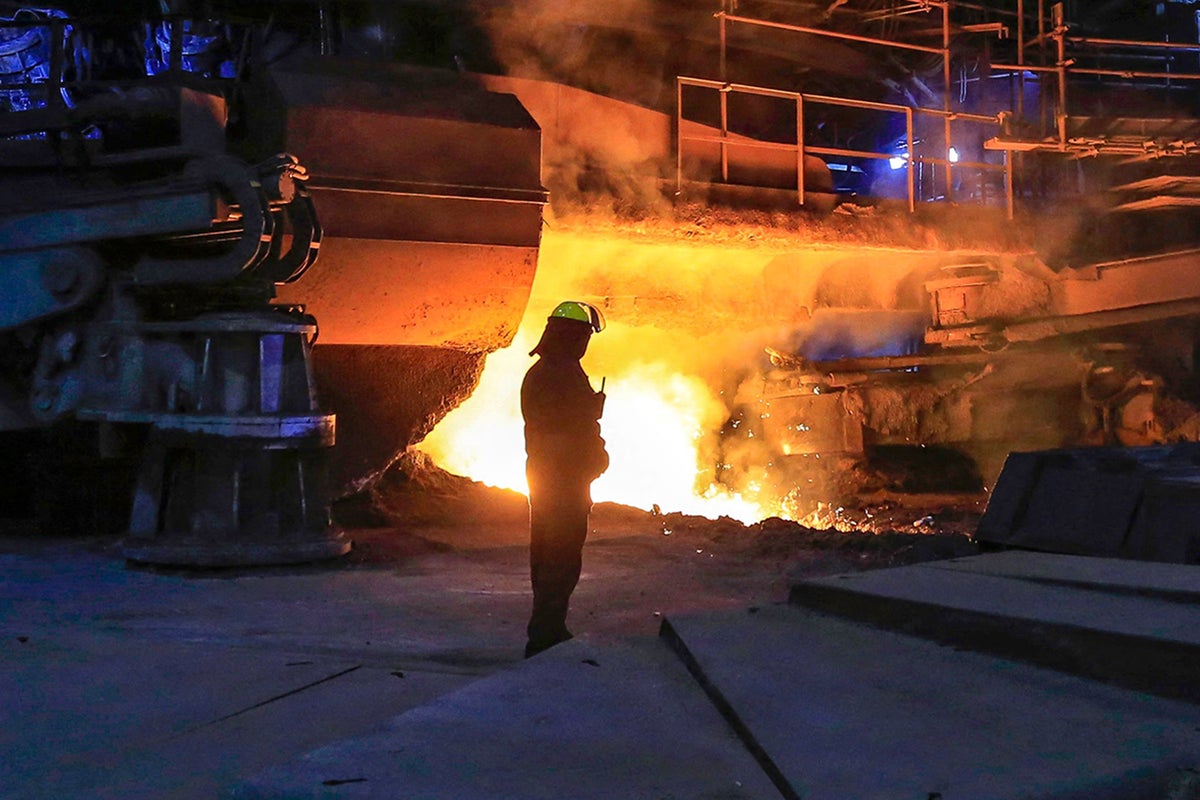It is a jarring fact indeed that in Britain – a G7 economy and Promethean birthplace of the industrial revolution; an island still sitting on coalfields and deposits of iron ore – the routine movements of raw materials for making steel are the subject of interference, plotting and breaking news.
When the TV news networks unleash the helicopters, as they have at the British Steel works in Scunthorpe and the docks in Immingham, tracking the movements of raw materials is a sign that a major national story is unfolding. It is no exaggeration to say that the urgency and 24/7 rolling coverage are comparable to a royal funeral.
It has all the elements of any thriller: the blast furnaces that have been in non-stop operation have only days – if not hours – of life left in them before they are extinguished forever. What would go with them is an asset of strategic importance, vital to national security, amid intense fears of sabotage from China.
It is a truly shocking state of affairs. While Britain is, rightly, greenlit to foreign investors and has much to offer, we must not – and will not – tolerate destructive behaviour by nations such as China masked as investment. Sir Keir Starmer has been swift to recognise the dangers – and to put measures in place to protect British industry.
This “race to save British Steel” (or at least the part trading under that name), is hugely portentous – and precarious. It must provide lessons and act not only as a sober warning for Britain to protect its interests but also as a caution to those who would seek to take advantage. It is difficult to imagine this happening in Japan or Germany. Or, indeed, in China, the home of the Jingye Group, nominally still the owner of British Steel.
It’s not hard to imagine a minister of the Chinese government holding near-dictatorial powers to control its steel industry. It is, however, truly shocking that this could be brought here, to Britain’s doorstep.
It is entirely right, then, that under these dire circumstances a democratic British government, respectful of the rights of property, has seized control – and, in effect, expropriated – a private company, even one that is nominally under the direction of the Chinese Communist Party; regardless of the fact that the Chinese foreign ministry is complaining about whether Britain is a trustworthy place for foreign direct investment.
The prime minister and the unlikely generalissimo of British heavy industry, Jonathan Reynolds, are “confident” that supplies of coming coal can be secured and that the blast furnaces will not go out. It is a great relief. Yet the government – and its predecessors – will need to answer some hard questions about how things ended up in this sorry state.
Mr Reynolds has given his account of how he was, in essence, strung along and misled by Jingye, which is not how a major industrial group should behave. But he and the Starmer administration have narrowly missed a debacle that would have been even more costly than any likely rescue – and after some weeks when the public warnings about the approaching dire situation were coming from the unions and the opposition parties.
One particular issue that needs to be determined is whether the proposed coking coal operation at Whitehaven, understandably vetoed on environmental grounds, really would have provided a ready source of that crucial ingredient – and why Mr Reynolds maintains that it was “not material that we could have used at British Steel”. There seems some confusion about that, as there is with the events immediately preceding the emergency powers granted by parliament on Saturday.
In his recent interviews, Mr Reynolds has sought to draw a distinction between those strategic sectors where Chinese entities are (putting it crudely) not to be trusted, such as steel; and others, for example, automotive. Presumably, the Chinese involvement in the Greene King brewery isn’t a potential matter of national survival – but the operations of water utilities are.
Fundamental issues are raised in this nascent post-globalisation world, such as where the UK will go to find investment and trading partners. For very different reasons over the past decade, Brexit has erected trade barriers with the European Union, President Trump has imposed tariffs on British goods exports to the United States, and the UK is drifting into a kind of economic cold war with China.
Meanwhile, the free trade deal with India that every prime minister since David Cameron has so ardently pursued remains elusive. (It’s worth noting too that Tata of India happens to be in charge of most of the rest of the British steel industry.) That does not leave much of the global economy.
What the British Steel affair illustrates is that its long history as the first industrial nation, its maritime trading traditions and an eager embrace of globalisation have made the UK one of the most open economies in the world – and thus especially vulnerable to the current wave of protectionism. We must be careful of appearing hostile to foreign investors.
Nevertheless, it is certainly in the national interest to rescue British Steel – and see it provide all the rails, beams and girders for the major housing, defence and infrastructure projects that will soon be providing plenty of orders for Scunthorpe. It is, more than that, a matter of national security.


